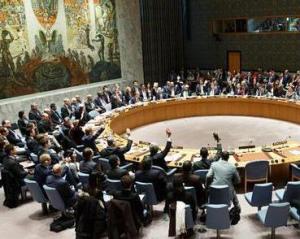Media Report

- The New York Times reports: "The United Nations Security Council on Monday ratcheted up sanctions yet again against North Korea, but they fell significantly short of the far-reaching penalties that the Trump administration had demanded just days ago. While the sanctions were described in Washington and other capitals as the most extensive yet, in the end they amounted to another incremental increase of pressure on the country, even after it detonated its sixth and most powerful nuclear device. It was far from clear that the additional penalties would accomplish what the Trump administration said was its goal: To force North Korea to halt its nuclear and ballistic missile tests and reopen some kind of negotiation toward eventual nuclear disarmament... Although the resolution won backing from all 15 council members, the weakened penalties reflected the power of Russia and China... In his remarks, the Chinese envoy, Liu Jieyi, warned the United States against efforts at 'regime change' and the use of military force. 'China will continue to advance dialogue,' he said. China and Russia have jointly proposed a freeze on Pyongyang's missile and nuclear tests in exchange for a freeze in joint military drills by South Korea and the United States. The Americans have rejected that proposal."
- CNBC comments: "The Chinese National Congress is set to meet in mid-October, and some predict the session will have wide-reaching implications for global markets and the economy. Discussions around the growth of the country's debt in recent years will be particularly consequential, said Chad Morganlander, portfolio manager at Washington Crossing Advisors. 'One critical thing to watch is how they rebalance their economy. Over the course of the last five years, you've actually seen nonfinancial debt in China increase by roughly $14 trillion, which is pretty close to 90 to 100 percent growth. That growth rate is not sustainable,' Morganlander said Monday on CNBC's "Trading Nation." This apparent mountain of debt has created 'financial fragility' across China, he said, and the country's Communist party would like to 'decelerate' that growth rate. 'Unfortunately, that rebalancing does have major implications on U.S. markets and foreign markets," he said, given the massive amount of goods consumed and produced in the country and the many international markets it touches. On Monday, China began scaling back measures that support the Chinese yuan following its rally this year against the U.S. dollar and other rival currencies."
- Politico comments: "Sixty years ago this fall, the Soviet Union shocked the world by launching into orbit Earth's first artificial satellite, Sputnik 1... In recent months, China has quietly given the United States a series of new "Sputnik Moments"—not as dramatic as a radio beacon from overhead, but just as significant as a challenge to American technological leadership. And as U.S. debates have focused on trade deficits and recovering manufacturing jobs, Beijing has achieved the scientific and technological feats that herald its arrival as an innovation superpower. These "Sputnik Moments" extend across multiple industries, from communications technology to renewable energy. Collectively, they pose a risk to America's future economic dynamism, as well as its military superiority. These largely overlooked "Sputnik Moments" have thus far failed to galvanize a U.S. response... In fact, they underscore the need for action to sustain America's innovation edge. Improving the quality of the U.S. education system and ensuring sufficient government funding for long-term research and development is essential, but will only succeed if the United States simultaneously addresses China's sweeping and ambitious effort to acquire U.S. technology."
Calendar
- 2017-09-11 Indonesia, Long on Sidelines, Starts to Confront China's Territorial Claims
- 2017-09-08 'Lips and teeth' no more as China's ties with North Korea fray
- 2017-09-07 China agrees U.N. action, and talk, needed to end North Korea crisis
- 2017-09-06 China's yuan has fully recovered from 2016 and analysts say there's still room to run
- 2017-09-05 'Poke in the eye': Will nuclear test force Chinese rethink on North Korea?
- 2017-09-04 China urges North Korea to 'stop taking actions that are wrong'
- 2017-09-03 China's Xi says BRICS must promote open world economy
- 2017-09-01 As China’s big leadership revamp nears, Xi Jinping is carrying out a military reshuffle
- 2017-08-31 China-US Trade Wars and the IP Elephant in the Room
- 2017-08-30 Trump wants China to fix North Korea, but it isn't going to happen
News
- The New York Times After U.S. Compromise, Security Council Strengthens North Korea Sanctions
- CNBC Why China's big meeting will matter for US markets
- BBC News China banks fear US North Korea sanctions
- The Hill China, Russia warn U.S. against regime change in North Korea
- The Washington Post U.N. agrees to toughest-ever sanctions against North Korea
- CNBC Trade investigation pours 'cold water' on US-China relationship, Chinese official says
- The New York Times China's Currency Rebounds as Economic Optimism Returns
- CNBC China is performing a high-wire balancing act on the yuan
- Reuters Nations should maintain free trade amid fragile world economy, China says
- The Wall Street Journal Living in China Takes 3½ Years Off Your Life`
- Los Angeles Times China is banning traditional auto engines. Its aim: electric car domination
- CNBC China is considering major investments in European finance as part of its global spending push
- CBS News China jails man for teaching Islam online
Commentary
- Politico Is China leaping past us?
- The Washington Post The real reason China won't turn against North Korea
- The National Interest It Is Time for China to Prepare for the Worst in North Korea
- Foreign Policy A Silk Road Marriage
- Quartz Russia and China are proving Trump right on North Korea: They hold all the cards
- New York Post Make North Korea feel pain — no matter how much China squeels
- The Atlantic Big in China: License-Plate Marriages